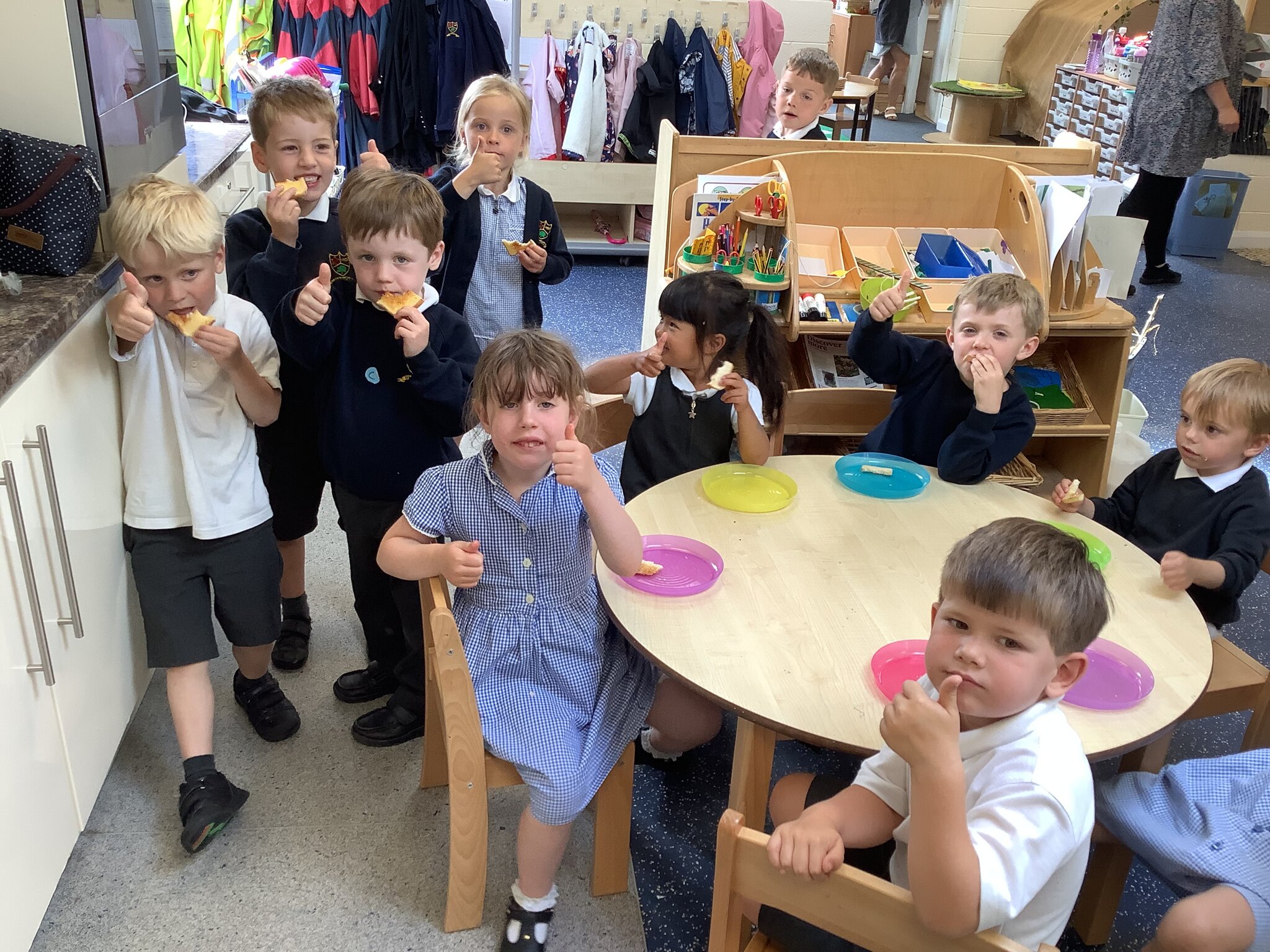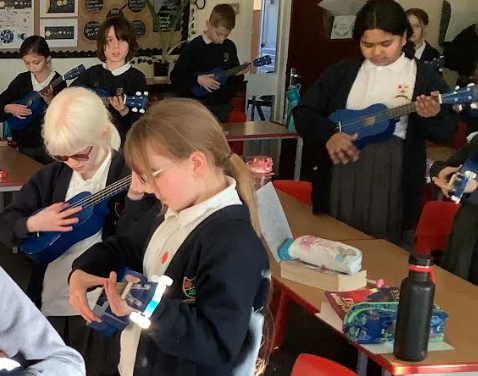
The Whitefield Curriculum Approach
At Whitefield Primary School, pupil’s learning is at the heart of our school’s curriculum. All children are entitled to a curriculum that provides opportunities for them to achieve and learn. We embrace our Healthy Hearts, Healthy Bodies and Healthy Minds vision and ensure all children are ready for their next steps. Our curriculum is designed with pupil’s learning at the centre. We ensure that our whole school curriculum offers pupils opportunities to grow as individuals and learners. We are ambitious for every child and have high expectations for everyone by providing coherent learning opportunities.
We aim to provide a knowledge-rich, broad and balanced curriculum. Each subject is taught discretely to allow children to understand the importance of disciplinary knowledge and build on previous knowledge and skills which enable links to be made as their learning progresses. Great emphasis is placed on subject specific vocabulary to enable children to communicate effectively and confidently. We aim to ensure pupils enjoy learning and feel prepared for life in the wider world. We also to offer our pupils experiences through visits and extra-curricular activities.
SUPPORTING PUPIL WITH ADDITIONAL NEEDS (SEND)
We make adaptations and reasonable adjustments within all subject areas to ensure a child who has additional needs can access the learning opportunities within the curriculum. Examples of practice we have adapted are listed within individual subjects. The class teacher and the SENCo will work alongside you and your child to support any reasonable adjustments that can be made.
In Reception, we use the Statutory Framework for the Early Years Foundation Stage (2021) and Development Matters in the Early Years Foundation Stage Guidance (revised July 2021) to shape our curriculum, placing an emphasis on developing key skills, knowledge and understanding. We do this through direct teaching and structured continuous provision in line with the EYFS framework.
Our Year 1-6 curriculum is based on the National Curriculum. The National Curriculum document shows the statutory objectives for the knowledge, skills and understanding that we teach at Whitefield Primary from Year 1 to Year 6.
Forest School - our Forest School leader is Mrs Ward
As part of our Reception curriculum, every child accesses our forest school provision once a week.
OPAL - outdoor play and learning - our OPAL leader is Mrs Willers, who is supported by Mrs Ward, Mrs Helm and the play team
English - our leaders for English are Miss Mansfield (writing) and Mr Ginty (reading)
As part of our curriculum, English opportunities are planned through a variety of ways including through our high quality texts or through other curriculum areas. Teachers have access to a variety of resources, which help to embellish planning and ensure the teaching of reading develops into writing opportunities. In English lessons, across both key stages, teachers plan a sequence of lessons that explore quality texts and give pupils the opportunity to practice writing and reading skills through the use of co-operative learning structures. Teachers model these skills on regular basis and planning, editing, publishing and computing based tasks are be planned and delivered as part of the teaching sequence. Writing is taught using the ‘Read to Write’ scheme of learning.
Phonics - our phonics leader is Mrs Ginty
Phonics is taught following the ‘Essential Letters and Sounds’ programme. Children learn how to develop their reading abilities through the act of decoding and blending. The programme teaches children the link between the sounds of our language (phonemes) and the written representation of these sounds (graphemes) or the spellings of the sounds contained within the English language.
Essential Letters and Sounds is a complete Systematic Synthetic Phonics Programme (SSP) accredited by the DFE.
Mathematics - our maths leaders are Miss Nuttall and Mrs Nugent
The White Rose Maths Hub plans across school to ensure that there is appropriate breadth and depth in our maths curriculum. Pupils have opportunities to practise the basic skills and memorise key number facts such as number bonds and times tables to help them develop greater fluency in their mathematical development and develop their mathematical reasoning and problem solving.
Reception, Year 1 and Year 2 children follow the NCETM mastery in arithmetic. In Key Stage Two we use Big Maths to support this area of learning
Science, History and Geography - our leaders are Mrs Williams (Science), Mrs Huxtable (History) and Miss King (Geography)
School had adopted the CUSP (Curriculum with unity schools partnership) curriculum: an approach underpinned by research evidence and cognitive science. It is ambitious and designed to teach and enrich knowledge and cultural capital for all pupils. It is vocabulary focussed and aims to equip children with the technical language needed to talk about their learning in a precise manner in science, history and geography. Knowledge organisers are used with learning modules that support vocabulary development. Science, history and geography are taught in a series of modules, which are regularly revisited within each academic year and built upon in subsequent years. Pupils access mini quizzes at regular intervals within modules thus challenging them to recall their learning.
Computing - our computing leader is Mr Ginty
We base our computing curriculum on the CUSP Ipad Curriculum scheme of work which ensures pupils gain a solid grasp of the knowledge, skills and understanding needed to be secure within the computing curriculum. Each year group has a schedule of units that progress across all key stages and consistently build on prior knowledge. Purple Mash also allows opportunities for children to use and apply ICT skills to other curriculum areas. Additionally, we have sets of devices in school that are used to enhance learning in other subjects. These help to produce learning outcomes through the application of ICT skills to other areas of the curriculum.
Online safeguarding is at the centre of our computing curriculum and is covered in each year group every term.
Music - our music leader is Mrs Kimberley

Our music teaching across school uses the Charanga scheme of learning. This is a well-structured programme of learning that builds pupils knowledge, skills and understanding in music giving them time to study important pieces of music and also to learn how to create music. Each unit of work comprises the of strands of musical learning which correspond with the national curriculum for music: Listening and Appraising; Musical Activities; Performing
Below is our music development plan for 2024-2026:
Physical Education and Sport - our PE and sport leader is Mr Roberts
Our PE curriculum is supported by Primary PE Planning scheme. Through this scheme of work, we are able to deliver high quality in PE lessons to all children. Resources link together to ensure physical literacy is being developed over a variety of areas of Physical Education. The resources take each pupil on a progressive learning journey from Early Years through to KS1 and KS2.
We are supported by Preston North End community and schools partnership and South Ribble sports development (SSSD) team - this is funded via the school’s sports premium funding. We invite specialist coaches in our school who delivers sport and PE across both Key Stages. They are highly qualified in a range of sports and work very closely with staff members to help promote CPD with all teachers. This also ensures that every child in our school has an experience of receiving high quality PE in their PE lessons throughout the year.
Swimming
At Whitefield Primary School, we aim to provide a meaningful and safe swimming experience for all children in KS2. We strive to meet the requirements of the National Curriculum of being able to confidently swim 25m unaided using a preferred stroke. In Year 6, children have the opportunity to learn how to swim and be taught how to stay safe in and around water.
Languages - our language leader is Miss Nuttall
Children learn French in KS2 and we follow Language Angels scheme of work. This scheme ensures full curriculum cover and progression and is engaging for our pupils through use of songs and interactive resources.
Religious Education - our RE leader is Mrs Kimberley
We follow the Lancashire agreed syllabus for religious education. At the heart of Lancashire's syllabus is the quest to understand what it is to be human. Pupils explore:
- Shared human experience
- Religious traditions
- Beliefs and values
- Personal meaning
Children are supported in the formulation of their own beliefs, values and attitudes, in preparation for their adult life in a rapidly changing world. The skills and attitudes developed through RE also contribute to pupils’ personal development and well-being, understanding of British values and to community cohesion by promoting mutual respect and tolerance in a diverse society.
PHSE - our PSHE leader is Mrs Napier
National Curriculum Guidance: ‘All schools should make provision for personal, social, health and education (PHSE); drawing on good practice.’
In July 2019, the government made Relationship, Physical Health and Mental Wellbeing Education (RHSE) compulsory for all primary schools from September 2020. These compulsory and non-compulsory elements are included in our school curriculum. It is our statutory responsibility to support pupil’s spiritual, moral, cultural, mental and physical development and prepare them for the opportunities, responsibilities and experiences of life. At Whitefield Primary School, the scheme of work we follow is the ‘Jigsaw’ programme of study, which is a spiralled curriculum that is split into the following whole school themes:
• Autumn1: Being Me in My World
• Autumn 2: Celebrating Difference
• Spring 1: Dreams and Goals
• Spring 2: Healthy Me
• Summer 1: Relationships
• Summer 2: Changing Me
PHSE is integral to our whole-school curriculum and the wider community: ensuring all children are happy, safe and confident; therefore, maximising their learning potential and providing them with the skills to succeed and adapt in the wider world.
Throughout the year, we enhance our curriculum with themes and activities; which relate to specific days/weeks/world events. E.g., Autism Awareness Day, Black History Month, Samaritan’s Christmas Appeal, First-Aid and Economic Well-Being, etc.
Art & Design - the art leader is Mrs Smith
At Whitefield we provide a progressive and engaging art curriculum in KS1 & KS2 using our very own scheme of work, written and developed by Mrs Smith. Pupils are taught about formal elements of art and develop skills in a range of approaches. Children are given opportunities to further develop and apply their skills through the units.
Design Technology - the design technology leader is Mrs Smith
At Whitefield we provide a progressive and engaging DT curriculum in KS1 & KS2 using our own scheme of work, written and developed by Mrs Smith.
Click on the links below to see the yearly curriculum overviews for each year group.
.png)